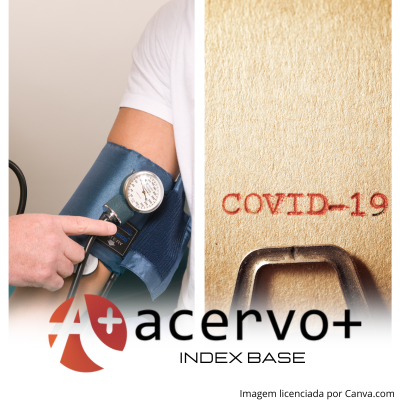Impactos da COVID-19 no tratamento da hipertensão arterial sistêmica
##plugins.themes.bootstrap3.article.main##
Resumo
Objetivo: Analisar os impactos da pandemia de COVID-19 no tratamento da hipertensão arterial sistêmica. Revisão bibliográfica: Os impactos diretos da COVID-19 no sistema cardiovascular, incluindo agravamento da hipertensão e complicações associadas. O isolamento social reduziu a adesão ao tratamento, aumentou o estresse e alterou os hábitos de vida, como dieta e exercício, contribuindo para o descontrole da pressão arterial. Ademais, o acesso aos serviços de saúde foi comprometido, especialmente para grupos socioeconômicos desfavorecidos, aumentando as disparidades de saúde. A telemedicina emergiu como uma solução viável, mas sua implementação foi desigual. A incidência de HDP aumentou significativamente em 2020, com a quarentena associada à maior ganho de peso gestacional, taxas de obesidade, pressão arterial elevada e ácido úrico. Considerações finais: Estratégias de intervenção na Atenção Primária à Saúde, como educação remota e apoio social, são essenciais para enfrentar os desafios da pandemia e promover melhores resultados de saúde para pacientes com HAS.
##plugins.themes.bootstrap3.article.details##
Copyright © | Todos os direitos reservados.
A revista detém os direitos autorais exclusivos de publicação deste artigo nos termos da lei 9610/98.
Reprodução parcial
É livre o uso de partes do texto, figuras e questionário do artigo, sendo obrigatória a citação dos autores e revista.
Reprodução total
É expressamente proibida, devendo ser autorizada pela revista.
Referências
2. AMANCIO ADM, et al. Telemonitoramento dos idosos de natal-rn na atenção primária durante a pandemia da covid-19: estudo longitudinal descritivo. Rev. Ciênc. Plur, 2023, 33526-33526.
3. BROOKS S, et al. The psychological impact of quarantine and how to reduce it: rapid review of the evidence. Lancet, 2020; 395(10227): 912–920.
4. CAI Q, et al. Home Quarantine: A Double-Edged Sword During COVID-19 Pandemic for Hypertensive Disorders of Pregnancy and the Related Complications. Diabetes, metabolic syndrome and obesity: targets and therapy, 2022;15: 2405–2415.
5. DA CONCEIÇÃO EM, et al. A percepção do enfermeiro na atenção básica em relação a adesão ao tratamento anti-hipertensivo com idosos em meio a pandemia do Covid-19 em um Município no interior de Pernambuco. Brazilian Journal of Development, 2021; 7(7): 75330-75343.
6. DA SILVA WBH, et al. O que a pandemia da COVID-19 fez com a pressão arterial sistêmica?. Global Academic Nursing Journal, 2021; 2(Spe. 2): e105-e105.
7. DE ALMEIDA GC, et al. Nova Geração da Telessaúde: Oportunidades, Tendências e Desafios. Sociedade Brasileira de Computação, 2023.
8. DERINGTON CG, et al. Angiotensin II receptor blocker or angiotensin-converting enzyme inhibitor use and COVID-19-related outcomes among US Veterans. PLoS One, 2021;16(4): e0248080.
9. DI RENZO L, et al. Eating habits and lifestyle changes during COVID-19 lockdown: an Italian survey. Journal of translational medicine, 2020; 18(1): 229.
10. EMAMI A, et al. Prevalence of Underlying Diseases in Hospitalized Patients with COVID-19: a Systematic Review and Meta-Analysis. Archives of academic emergency medicine, 2020; 8(1): e35.
11. GALINDO LLD, et al. Estratégia de saúde da família: métodos para captação e manutenção de pacientes na atenção básica. Brazilian Journal of Health Review, 2024; 7(2): e67774-e67774.
12. GARFAN S, et al. Telehealth utilization during the Covid-19 pandemic: A systematic review. Computers in biology and medicine, 2021; 38: 104878.
13. GOLD R, et al. Cardiovascular Disease Risk Management During COVID-19: In-Person vs Virtual Visits. American Journal of Managed Care, 2024; 30(1).
14. GUZIK TJ, et al. COVID-19 and the cardiovascular system: implications for risk assessment, diagnosis, and treatment options, Cardiovascular Research, 2020; 116(10): 1666–1687.
15. HARTNETT K, et al. Impact of the COVID-19 Pandemic on Emergency Department Visits - United States, January 1, 2019-May 30, 2020. MMWR, 2020; 69(23): 699–704.
16. HOOPER MW, et al. COVID-19 and Racial/Ethnic Disparities. JAMA. 2020;323(24):2466–2467.
17. KORVES C, et al. Hypertension Control During the Coronavirus Disease 2019 Pandemic: A Cohort Study Among US Veterans. Medical care, 2024; 62(3): 196-204.
18. MEHTA B, et al. Hydroxychloroquine and Chloroquine in COVID-19: A Survey of Prescription Patterns Among Rheumatologists. J Clin Rheumatol, 2020; 26(6): 224-228.
19. MELERO FILHO CAL. Estrutura de personalidade e sucesso profissional: uma revisão de literatura nos últimos quinze anos. A Saúde Pública e o Bem-Estar da Sociedade 2, 2023: p. 59.
20. PALMER K, et al. The potential long-term impact of the COVID-19 outbreak on patients with non-communicable diseases in Europe: consequences for healthy ageing. Aging clinical and experimental research, 2020; 32(7):1189–1194.
21. PALOSKI GDR, et al. Contribuição do telessaúde para o enfrentamento da COVID-19. Escola Anna Nery,2020;24.
22. PASSOS HD, et al. SARS-Cov-2 Infection and Pulmonary Thromboembolism - The Prothrombotic State in COVID-19. Arq Bras Cardiol, 2020;115(1): 142-145.
23. RAIFMAN MA e RAIFMAN JR. Disparities in the Population at Risk of Severe Illness From COVID-19 by Race/Ethnicity and Income. Am J Prev Med, 2020; 59(1): 137-139.
24. SCHOLZ JR, et al. COVID-19, Renin-Angiotensin System, Angiotensin-Converting Enzyme 2, and Nicotine: What is the Interrelation? Arq Bras Cardiol, 2020; 115(4):708-711.
25. SMITH AC, et al. Telehealth for global emergencies: Implications for coronavirus disease 2019 (COVID-19). Journal of telemedicine and telecare, 2020; 26(5): 309–313.
26. WANG S, et al. Association of social isolation and loneliness with the risk of hypertension in middle aged and older adults: Findings from a national representative longitudinal survey. Journal of Affective Disorders, 2024;349: 577-582.
27. ZHOU F, et al. Clinical course and risk factors for mortality of adult inpatients with COVID-19 in Wuhan, China: a retrospective cohort study. Lancet (London, England), 2020; 395(10229): 1054–1062.

